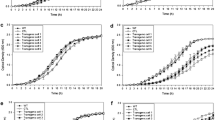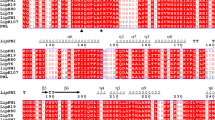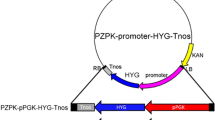Abstract
Escherichia coli (E. coli) has been widely used as a host organism for producing recombinant proteins such as biocatalysts, antibody fragments, and therapeutic hormones. To enhance recombinant protein production, many E. coli strains have been genetically engineered on practical purposes. In this study, we developed the engineered E. coli strain expressing Heat shock protein 70, DcHsp70, from carrot (Daucus carota L.). The DNA construct for DcHsp70 expression, Lipoprotein promoter—DcHsp70 gene—Flippase recognition target cassette, which is flanked by the insertion site yddE pseudogene sequences, was generated by overlap PCR and inserted into the E. coli genome by lambda Red-mediated homologous recombination. To examine if the engineered E. coli cells can effectively produce recombinant proteins, the alcohol dehydrogenase (ADH) gene from a thermophile, Geobacillus stearothermophilus, was cloned into a pET11a expression vector and expressed by isopropyl β-d-1-thiogalactopyranoside treatment. Compared to wild type, the genetically engineered E. coli expressing DcHsp70 exhibited up to approximately 11-fold higher production of his-tagged ADH, mostly in soluble forms. The his-ADH protein that was purified from the engineered cells exhibited the enzyme activity. The genetically engineered E. coli developed in this study can be useful for the efficient production of recombinant proteins, such as recombinant ADH.





Similar content being viewed by others
References
Baherib HR, Hilla GA, Roeslera WJ (2001) Modelling plasmid instability in batch and continuous fermenters. Biochem Eng J 8:45–50
Bertelsena EB, Changb L, Gestwickib JE, Zuiderwega ERP (2009) Solution conformation of wild-type E. coli Hsp70 (DnaK) chaperone complexed with ADP and substrate. Proc Natl Acad Sci USA 106:8471–8476
Bradford MM (1976) A rapid and sensitive method for the quantitation of microgram quantities of protein utilizing the principle of protein-dye binding. Anal Biochem 72:248–254
de Marco A, Vigh L, Diamant S, Goloubinoff P (2005) Native folding of aggregation-prone recombinant proteins in Escherichia coli by osmolytes, plasmid- or benzyl alcohol-overexpressed molecular chaperones. Cell Stress Chaperones 10:329–339
Edenberg HJ (2007) The genetics of alcohol metabolism: role of alcohol dehydrogenase and aldehyde dehydrogenase variants. Alcohol Res Health 30:5–13
Joseph BC, Pichaimuthu S, Srimeenakshi S, Murthy M, Selvakumar K, Ganesan M, Manjunath SR (2015) An overview of the parameters for recombinant protein expression in Escherichia coli. J Cell Sci Therapy 6:1
Kafri M, Metzl-Raz E, Jona G, Barkai N (2016) The cost of protein production. Cell Rep 14:22–31
Ko E, Park H, Ahn YJ (2015) Functional mechanism of plant heat shock protein and development of stress tolerant yeast strain. J Hortic Sci Biotechnol 90:451–458
Machielsen R, Uria AR, Kengen SWM, van der Oost J (2006) Production and characterization of a thermostable alcohol dehydrogenase that belongs to the aldo-keto reductase superfamily. Appl Environ Microbiol 72:233–238
Mamipour M, Yousefi M, Hasanzadeh M (2017) An overview on molecular chaperones enhancing solubility of expressed recombinant proteins with correct folding. Int J Biol Macromol 102:367–375
Park H, Ahn YJ (2016) Development of transgenic Escherichia coli with improved viability by heterologous expression of a heat shock protein gene from carrot (Daucus carota L.). HortScience 51:305–310
Rosano GL, Ceccarelli EA (2014) Recombinant protein expression in Escherichia coli: advances and challenges. Front Microbiol 5:172
Sahu SK, Thangaraj M, Kathiresan K (2012) DNA extraction protocol for plants with high levels of secondary metabolites and polysaccharides without using liquid nitrogen and phenol. ISRN Mol Biol; Article ID 205049
San-Miguel T, Perez-Bermudez P, Gavidia I (2013) Production of soluble eukaryotic recombinant proteins in E. coli is favored in early log-phase cultures induced at low temperature. Springerplus 2:89
Schein CH (1989) Production of soluble recombinant proteins in bacteria. Nat Biotechnol 7:1141–1149
Sung D, Kaplan F, Guy CL (2001) Plant Hsp70 molecular chaperones: protein structure, gene family, expression and function. Physiol Plantarum 113:443–451
Valdez-Cruz NA, Ramírez OT, Trujillo-Roldán MA (2011) Molecular responses of E. coli caused by heat stress and recombinant protein production during temperature induction. Bioeng Bugs 2:105–110
Walker JRL (1992) Spectrophotometric determination of enzyme activity: alcohol dehydrogenase (ADH). Biochem Educ 20:42–43
Waters ER, Lee GJ, Vierling E (1996) Evolution, structure and function of the small heat shock proteins in plants. J Exp Bot 47:325–338
Zhang Y, Muyrers JP, Testa G, Stewart AF (2000) DNA cloning by homologous recombination in Escherichia coli. Nat Biotechnol 18:1314
Zheng YG, Yin HH, Yu DF, Chen X, Tang XL, Zhang XJ, Xue YP, Wang YJ, Liu ZQ (2017) Recent advances in biotechnological applications of alcohol dehydrogenases. Appl Microbiol Biotechnol 101:987–1001
Zhu X, Zhao X, Burkholder WF, Gragerov A, Ogata CM, Gottesman ME, Hendrickson WA (1996) Structural analysis of substrate binding by the molecular chaperone DnaK. Science 272:1606–1614
Acknowledgements
This research was supported by a 2018 Research Grant from Sangmyung University.
Author information
Authors and Affiliations
Corresponding author
Ethics declarations
Conflict of interest
The authors declare that there is no conflict of interest related to this study.
Additional information
Publisher's Note
Springer Nature remains neutral with regard to jurisdictional claims in published maps and institutional affiliations.
Electronic supplementary material
Below is the link to the electronic supplementary material.
Supplementary Table 1.
Primers used in this study. Supplementary Fig. 1. Nucleotide sequences of DcHsp70 gene. Supplementary Fig. 2. Confirmation of DcHsp70 gene insertion and its heterologous expression in genetically engineered E. coli. (a) PCR showed the successful insertion of the DNA construct, Lpp (lipoprotein) promoter—DcHsp70 gene (Daucus carota heat shock protein 70)—FRT (flippase recombination target) cassette, in the genetically engineered E. coli cell lines (TCs). Amplified products with an expected size (approximately 2,000 bp) were detected. (b) Immunoblot analysis using a monoclonal anti-Hsp70 antibody showed a positive signal with an expected size (approximately 70 kDa) in the TCs. (PPTX 170 kb)
Rights and permissions
About this article
Cite this article
Kim, M., Jang, B. & Ahn, YJ. Enhanced Production of Recombinant Alcohol Dehydrogenase Using the Genetically Engineered Escherichia coli Strain that Heterologously Expresses Carrot Heat Shock Protein 70. Curr Microbiol 76, 1338–1344 (2019). https://doi.org/10.1007/s00284-019-01730-8
Received:
Accepted:
Published:
Issue Date:
DOI: https://doi.org/10.1007/s00284-019-01730-8




